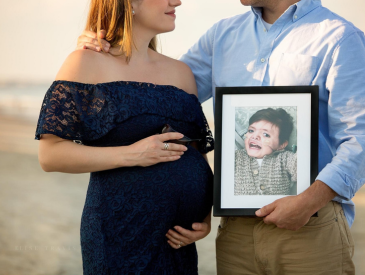Pregnancy After Child Loss
A “normal” pregnancy may have its complications, but pregnancy following child loss can be far more complex. With the joy and happy expectation may come a tangled web of other emotions: fear, anxiety, perhaps even guilt. Parents say that this pregnancy involves more planning, more decision-making. Acknowledging that memory and trauma are present along with hope may help the family live alongside the past as they move toward the future.

Your Team:
A member of the clergy who is responsible for the religious needs of an organization and/or its constituents.
A doctor who specializes in pregnancy, childbirth, and a woman’s reproductive system.
A specialist whose aim is to improve the quality of life of their patients over the course of their illness regardless of stage, by relieving pain and other symptoms of that illness.
A mental health professional who uses therapy and other strategies to support coping and adjustment and treat concerns regarding social, emotional, or behavioral functioning.
A trained professional who works with people, groups and communities to help them better their lives.
An individual who leads and/or guides individuals or groups coping with life experience and challenges.
A healthcare professional specializing in pregnancy, childbirth, and postpartum care.
A professional who is employed to provide guidance and support to a pregnant woman during labor.
An obstetrician, midwife and/or doula can hear and discuss your concerns as you go through the pregnancy and prepare for delivery. A psychologist, social worker, chaplain and/or spiritual leader or palliative care clinician can support you, your co-caregiver, and other family members in processing strong emotions. A child-life specialist can help you explain the pregnancy to your other children, if you have them.
When you have experienced the death of a child, you have ongoing emotional work. There may be feelings of self-doubt and questions about your ability to carry and deliver a healthy baby. New milestones may bring new feelings and evoke welcome or unwelcome memories.
Grieving through the pregnancy (and post-partum) may be mixed with hope and excited anticipation. Both grief and hope may be heightened as you consider certain questions and choices:
- Will you have the same care and delivery team? The same medical center? Some parents find comfort in the familiarity and others wish to have a fresh start with other clinicians.
- What testing, and how much, do you want to have? Will the data give you greater confidence or perhaps overwhelm you?
- What information do you wish to share with clinicians if they don’t already know you and your family history? What is the best timing for these conversations? Know that you can create whatever boundaries you want, understanding that some members of the medical team will directly ask for information in order to provide appropriate prenatal care.
- What information do you wish to share with others? How will you respond to their questions, opinions, advice?
- What support (counseling, spiritual guidance, self-care techniques, etc.) will be helpful to you and your co-parent, if you have one, through the process?
- If you have other living children, what do you need in order to explain the pregnancy and support them?
- How can you continue to feel connected with your deceased child as you welcome a new baby? The section Continuing Bonds offers potentially helpful ideas from clinicians and parents.
- How will you help the new baby “know” the sibling they will never meet? What stories will you want to tell? Are there rituals, traditions, celebrations that you want to keep or make anew?
Just as every pregnancy is different, there are no right or wrong answers to any of these questions—only what feels helpful to you. Many families find it constructive to talk through their issues and concerns with a professional (therapist, counselor, spiritual advisor, other).
– Lynette, parent of Zachary, Andy (deceased) and Jamie
Related Resources
-
 Archived Recording of CPN's In the Room: Pregnancy after Child Lossvideo
Archived Recording of CPN's In the Room: Pregnancy after Child Lossvideo -
 I'm learning more and more that there's not grief and, it doesn't have to be one over the other.video
I'm learning more and more that there's not grief and, it doesn't have to be one over the other.video -
 It's important to discuss your uncertainty at the prospect of bringing another child into the world.video
It's important to discuss your uncertainty at the prospect of bringing another child into the world.video -
 The hospital where I had my second daughter was the same hospital where Emerson diedvideo
The hospital where I had my second daughter was the same hospital where Emerson diedvideo -
 For my second pregnancy, “I just wanted a clean slate. I chose my very local OB-GYN.”video
For my second pregnancy, “I just wanted a clean slate. I chose my very local OB-GYN.”video -
 ‘As long as the new baby is healthy.’ That statement diminishes my son Andy’s life.video
‘As long as the new baby is healthy.’ That statement diminishes my son Andy’s life.video